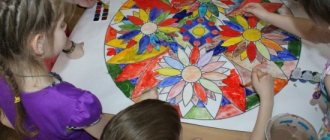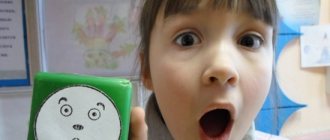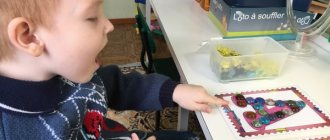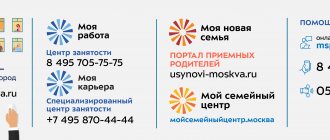Areas of joint activity
- establishing partnerships and creating an atmosphere of mutual support;
- formation of a motivated attitude of parents towards correctional activities;
- selection and implementation of various variable forms of interaction;
- increasing the psychological and pedagogical competence of parents in matters of child speech development;
- providing practical assistance to parents, supporting their confidence in their own pedagogical capabilities;
- training parents in specific speech therapy techniques
Stages and forms of interaction
Over the years of cooperation with the child’s family, I have developed a system of work that can be divided into four blocks, each of which contains its own forms of interaction between the speech therapist and parents:
- Diagnostics;
- Consulting;
- Prevention;
- Education;
We will now talk to you about each of these blocks separately.
Diagnostics
At the beginning of the school year, I examine children's speech. A speech therapy examination is based on general principles and methods of pedagogical study: it must be comprehensive and holistic. I begin the speech therapy examination by studying medical and pedagogical documentation and information about the child’s parents.
I meet families of children who need speech therapy help. I am conducting a survey in order to identify the problems and difficulties of a modern family, as well as to maximize the use of its educational potential and the positive experience of family education.
When planning a forecast for correctional work, I take into account:
- the role of all family members in raising a child.
- type of family upbringing.
From questionnaires and initial conversations, I find out the conditions for raising a child in a family, the child’s characteristics, hobbies, interests. I am interested in the complaints and concerns of parents, their opinions and wishes regarding the development of the child’s speech. This meeting is very important for both sides. Further cooperation depends on its atmosphere. At the very beginning, I try to involve parents in joint work, explain what kind of help I expect from them in education and training, in order to achieve success in speech therapy work.
Consulting
Providing assistance to parents during a specially organized conversation aimed at understanding the essence of the problem and ways to solve it.
Here, the theoretical training of a speech therapist is very important, who can give a clear answer to any question about speech impairment and its correction in a particular child. The competence of a specialist, of course, increases confidence.
Equally important is the parent’s awareness of the speech therapist as a specialist and the areas of his work. This is facilitated by mobile folders with articles about various speech disorders, health activities recommended for children with speech disorders and, of course, a schedule of speech therapist consultations.
If we talk about the information that is conveyed during the consultation, it is perceived better by parents if it is concise and lacks unclear terms. But the parent himself makes the choice whether to come for a consultation or not. If a parent comes for a consultation, it means that he is ready to listen to a specialist, he is motivated.
Prevention
Carrying out a set of activities with the participation of the family aimed at preventing possible disorders in the child
Education
At this stage, I familiarize parents with the age characteristics of children and the conditions that ensure full development. To do this: I organize exhibitions of books, methodological developments, the study of which could help the child’s family become more informed and enlightened about this problem, I develop booklets. I show parents fragments of classes with children, and invite them to open individual lessons so that each parent becomes familiar with the techniques and content of speech therapy work.
Another effective form of education, which I have been actively using in my work lately. This is the use of information and communication technologies. These include media aids (educational and teaching aids, videos, computer presentations); Internet sites of both a kindergarten and a personal site.
Each of the above-described forms of interaction with parents brings “fruit” in its own way in the work of a speech therapist teacher. And the most important result is the achievements and success of each child.
Article:
One of the important areas in the correctional and educational activities of a preschool speech therapist is working with parents - as one of the conditions for optimizing the pedagogical process and socialization of a child with speech disorders.
Involving families directly in educational activities is an important psychological and pedagogical condition for the successful implementation of the main educational program of a preschool educational institution. It is necessary to make parents active participants in the pedagogical process, teach them to adequately evaluate and develop their child. The goal of joint pedagogical work is to improve the quality of the correctional educational process to overcome speech disorders in preschoolers.
Modern forms of work with parents help improve their competence and significantly affect the effectiveness of all speech therapy work to eliminate speech disorders in preschoolers.
The issue of finding and implementing new forms of interaction between preschool educational institutions and families is one of the most pressing today. The world is constantly becoming more complex; there is not enough time for “live” communication. Therefore, teachers need to organize these types of events with parents so that they are more interesting and more important than everyday activities.
New forms of work between teachers and speech therapists with parents.
Currently, practice has accumulated a variety of modern (non-traditional) forms, but they have not yet been sufficiently studied and generalized. An informal approach to organizing and conducting these forms of communication confronts teachers with the need to use a variety of methods for activating parents. The classification of non-traditional forms is proposed by T.V. Krotova. The author identifies the following non-traditional forms:
- information and analytical;
- leisure, educational;
- visual and informational.
Information and analytical forms are aimed at identifying the interests and requests of parents, establishing emotional contact between teachers, parents and children. This includes surveys, tests, questionnaires, a “mailbox”, a “question tree” where parents can post questions that concern them.
Leisure forms - joint leisure activities, holidays, exhibitions - are designed to establish warm, informal, trusting relationships, emotional contact between teachers and parents, between parents and children. Leisure activities will create emotional comfort, thanks to them parents become more open to communication. Leisure forms include: thematic holidays “Festival of Correct Speech”, “New Year Tree”, “Festival of Mothers”, “Harvest Festival”, etc.
Cognitive forms . Improving the psychological and pedagogical culture of parents. Their essence is to familiarize parents with the age characteristics of preschool children and to develop practical skills in raising children.
Visual and informational forms in a non-traditional sound make it possible to correctly evaluate the activities of teachers and reconsider the methods and techniques of family education. For example, open educational activities for parents, viewing videos, photographs, presentations, exhibitions of children's works. Using multimedia tools, teachers can show several fragments of classes with children, the organization of routine moments in a preschool educational institution, and thus combine different forms of interaction.
New forms of holding parent meetings.
Only close contact between a specialist and parents can contribute to the elimination of speech defects in preschool age and further full-fledged school education.
One of the main forms of work on pedagogical education of the family is the parent meeting - this is an important element of the strategy of communication with the family, it lays the foundations for cooperation and mutual understanding, and ensures a unity of views on the upbringing and education of preschoolers.
At the present stage, teachers and speech therapists are increasingly using various forms of parent meetings such as:
- pedagogical workshop;
- conference;
- consultation;
- dispute;
- dialogue;
- discussion;
- workshop;
- training;
- experience;
- "round table";
- evening meeting;
- KVN, “Field of Miracles”, etc.
- together with children.
Parent trainings.
Systematization and continuity, constant consolidation of acquired knowledge and skills in speech therapy classes are very important in correctional work with speech therapy children. And in this case, parents are not outside observers, but active assistants to the speech therapist. Parents may well become “home speech therapists” for their children if they have appropriate training in play therapy methods for correcting speech disorders and speech development.
However, as experience shows, parents do not always know how to create the necessary conditions for the constant training of their child’s speech. As a result, children often lose the speech skills acquired during their stay in a preschool institution. This encourages speech therapists to look for such forms of work with parents, as a result of which they could subsequently create conditions for the constant training of their child’s speech. Therefore, the joint work of a speech therapist with parents becomes a necessary and integral part of the correction process.
Interaction with children’s parents is carried out in various forms, among them trainings are particularly successful.
Training is intensive training aimed at developing certain skills. Its main difference from other forms of work is that during the training each participant has access to not only the experience and knowledge of the teacher leading these classes, but also the knowledge and experience of other participants. Parents' ideas about their child's speech problem and ways to overcome it are expanded many times over. Often, just being in a group helps alleviate the problem. Parents who attend the training are convinced that not only their child has speech disorders. They see that parents of many families face similar difficulties. This means that there is no catastrophe in all this and speech problems can be solved.
The training is an active form of work with parents who want to change their attitude towards speech impairment and interaction with their own child, to make him more open and trusting. Participants in the training receive theoretical knowledge and participate in exercises that give them the opportunity to apply the acquired knowledge to a specific situation with their children.
Speech therapy diary
Individual homework assignments for correcting sound pronunciation are recorded in the diary. Completing tasks in a diary allows you to increase the time and frequency of speech exercises and achieve quick and lasting results.
On the first page of the diary, a sound pronunciation screen is displayed, which shows the number of impaired sounds in the child and the dynamics of sound pronunciation correction. Parents see how the sound correction process is progressing. This is indicated by the letters: “P” - the sound requires staging; We perform articulation exercises “A” - the sound requires automation in syllables and words; “D” - sounds need differentiation; “C” - it is necessary to ensure the correct pronunciation of this sound in independent speech. Thus, using the screen, parents can clearly see which sound has not yet been delivered, which one is being automated, and which one has been introduced into speech.
The diary also contains a description of articulation exercises that you can do with your child at home in front of a mirror. Homework is pre-worked individually in a lesson with a speech therapist. Parents complete the recorded task until a grade (sticker) appears in the notebook. The task is considered mastered when the child, at the request of the speech therapist, can easily pronounce the given sound, name pictures, repeat sentences, poems, etc., without prior preparation and searching for the necessary articulation.
Thus, when using a diary and the help of parents, consolidation of pronunciation skills is more productive. The phonetic diary encourages parents to complete their homework with their children in a timely and quality manner. And the stickers in the notebook make the child want to strive for better results.
The Internet and specialized publications as means of speech therapy education for parents.
It is often difficult for modern parents to find time to visit a preschool, school, or communicate with a teacher, especially if they do not see the need for it. The task of a speech therapist in working with parents is not only to help them understand their role in the child’s development process, but also to convince parents of the need for daily painstaking work together with the speech therapist to overcome speech disorders in the child. Therefore, a modern teacher, along with traditional forms of working with parents, must also use non-standard forms - computer technologies. Computer technologies are becoming an integral part of the lives of modern people; they are being introduced into various spheres of life, including the field of education.
The introduction of modern computer technologies into speech therapy practice makes it possible to make the educational work of a speech therapist more productive and effective. Communication with parents can be carried out using the Internet through blogs, websites, and email.
A blog is an online journal or diary of events. This is a website whose main content consists of regularly added posts, images or multimedia. Blogs are characterized by short entries of temporary significance, sorted in reverse chronological order (last entry on top). Features of the blog that allow a speech therapist to use it in practice:
- publicity, which distinguishes a blog from a simple diary, makes the materials accessible to parents to read;
- the ability to leave comments on blog posts that are available for reading, receive feedback from parents by responding to comments;
- the ability to post links, photos, videos allows the speech therapist to create an electronic portfolio, a methodological piggy bank;
- the ability to replenish, expand and enrich the material;
On the blog, parents receive information and practical advice on how to correctly conduct exercises, games, and tasks for children.
A website is a page or group of pages that are united by meaning, location and have a single design style. This is a specific place on the Internet where you can place any information, making it accessible from anywhere in the world.
A modern speech therapist can widely use these Internet capabilities to increase the efficiency of the correction process and collaborate with parents. It is advisable to post informational and educational information on the website.
Educational information may be contained in the following sections:
- “This is important to know” (contains information about the development of speech in ontogenesis, the etiology of disorders of oral and written speech, the consequences of untimely correction, etc.).
- “Useful books” (contains a list of popular speech therapy literature).
- “Play with me” (contains games aimed at developing mental processes and speech skills, indicating goals, objectives and equipment).
Thus, using the website of an educational institution, parents have the opportunity to receive information about events, answers to questions that concern them, and leave reviews and comments about the activities of specialists.
Thanks to the Internet, access to various sources of information, such as speech therapy websites, is available. On his page, a speech therapist can post links to sites useful for parents.
Electronic mail is a technology and the services it provides for sending and receiving electronic messages over a distributed computer network.
Using e-mail, a speech therapist can advise parents without visual contact, answer questions regarding the correction process, give recommendations, send out invitations to meetings, trainings, consultations, and also monitor the timely completion of homework. The speech therapist can send children tasks for independent homework: tests, task cards, picture dictations, reminders, etc.
The tasks are especially relevant when the child is sick and cannot attend classes. The exchange of various interesting materials, links to thematic sites, both between the teacher and the family, and between parents, can occur via e-mail. Thus, parents become active participants in the process of raising and educating children.
Specialized publications (books, media aids).
To carry out speech therapy propaganda among parents, you can use specialized publications, such as media aids and speech therapy books.
The media library is a collection of books, educational and teaching aids, videos, sound recordings, and computer presentations. A speech therapist can help parents choose educational programs and games for practicing at home, which allows them to consolidate the acquired knowledge in a playful way.
This information is communicated to parents in the form of a multimedia presentation or a thematic exhibition at which various media objects are presented, special speech therapy portals and Internet sites are mentioned.
In order for parents to effectively master certain speech therapy knowledge and skills, the speech therapist can independently record video consultations on various topics on electronic media, card files with tasks to consolidate the material, and offer them to parents at meetings and consultations.
Sample video topics:
- “Movable Tongue Lessons”;
- “Difficult sound - you are our friend”;
- “We play with our fingers - we develop speech”, etc.
Parent mail.
All parents want their children to be comfortable and interesting in kindergarten, so that the child can fully develop and communicate. That is why parents have various suggestions, wishes, comments or questions. Some proposals are very sensible and require careful consideration. It is for these purposes that “parent mail” is used.
Parent mail is one of the non-traditional forms of work that involves collecting and analyzing information. Allows the speech therapist to provide feedback to parents. The parent has the opportunity to anonymously ask a specialist a question. This type of interaction is necessary for very busy families who do not have the opportunity to meet with a speech therapist in person, and who, for various reasons, are afraid or embarrassed to ask this or that question.
Presentation of parent mail is possible at a parent meeting or meeting with parents; the teacher explains the mechanism of action of mail; it is necessary to conduct training - invite parents to fill the box in real time, and then answer the questions asked. That is, mail is a kind of prompt and adequate feedback between participants in the educational process: parents and teachers.
Electronic newspaper for parents.
One of the interesting and effective forms of interaction with the family of preschool children is the publication of an electronic newspaper for parents. Electronic means of interaction are gradually becoming a tool that can significantly improve the quality of education, making the learning process interesting and multifaceted.
An electronic newspaper is a way of psychological and pedagogical education of the family, the development of practical skills of parents in the formation of the child’s correct speech, and information about the life of the kindergarten.
Project activities.
The project method is most effective when working with families, as it allows parents, children, and teachers not only to take part in joint activities, but also to see the result of joint work, promotes emotional rapprochement between children, teachers, and parents in the process of joint activities, and the formation of a holistic sensory experience . One of the methods of active learning - the project method - can be considered a form of increasing the educational culture of parents and modernizing the information and educational function of cooperation.
In the course of solving the assigned tasks, a competent adult helps the child find the necessary means and methods for this, organizing conversations, joint trips to the library, reading children's educational and reference publications; observations and excursions, classes in hobby groups and studios.
Together with their parents, children are engaged in productive activities: collecting collections, designing family albums, drawing, sculpting, sewing, crafting, experimenting, inventing and composing. At the same time, it is very important that adults do not do anything for children and do not interfere with their ability to demonstrate maximum abilities, independence, initiative and creativity.
As a result of the introduction of new forms of work, the position of parents is changing. The systematic use of non-traditional forms in working with parents leads to attracting the attention of parents to the problems of raising and educating children, obtaining the necessary minimum of knowledge and, thus, improving the pedagogical culture. Most parents begin to purposefully deal with the problems of raising preschoolers with speech problems.
Used Books:
1. L.D. Morozov "Pedagogical design in preschool educational institutions: from theory to practice." Publishing house "Creative Center Sphere" - Moscow, 2010.
2. A.A. Mayer, O.I. Davydov “555 ideas for involving parents in the life of a kindergarten.” Publishing house "Creative Center Sphere" - Moscow, 2011.
3. V.S. Gainullova, E.M. Zotov “Kindergarten and School of the Future: the basics of cooperation and partnership.” Publishing house "Creative Center Sphere" - Moscow, 2011
4. E.A. Alyabyev “Thematic days and weeks in kindergarten” M.: 2012.
5. Zvereva O.L., Krotova T.V. Communication between a teacher and parents in a preschool educational institution: Methodological aspect. - M.: TC Sfera, 2010. - 80 p.
6. Zvereva O.L. Parent meetings in preschool educational institutions: Methodological manual / O.L. Zvereva, T.V. Krotova. – 4th ed. – M.: Iris-press, 2009. – 128
7. Dronova T.N. Interaction of a preschool institution with parents, - M, Sphere 2002
8. L.S. Vakulenko. Work of a speech therapist teacher with families: traditional and innovative approaches / ed. – St. Petersburg, 2012
9. O.V. Bachina, L.N. Samorodova. Interaction between a speech therapist and the family of a child with speech impairments - M.: TC Sfera, 2009. - 64 p.
10. Organization of interaction between the speech therapist and the family: Methodological manual. Ed. L.S. Vakulenko. St. Petersburg, “Childhood - Press”, 2011. 160 p.
11. Arnautova, E.P., Planning the work of a preschool educational institution with the family // Management of a preschool educational institution. - , 2012. No. 4 - pp. 33-38




